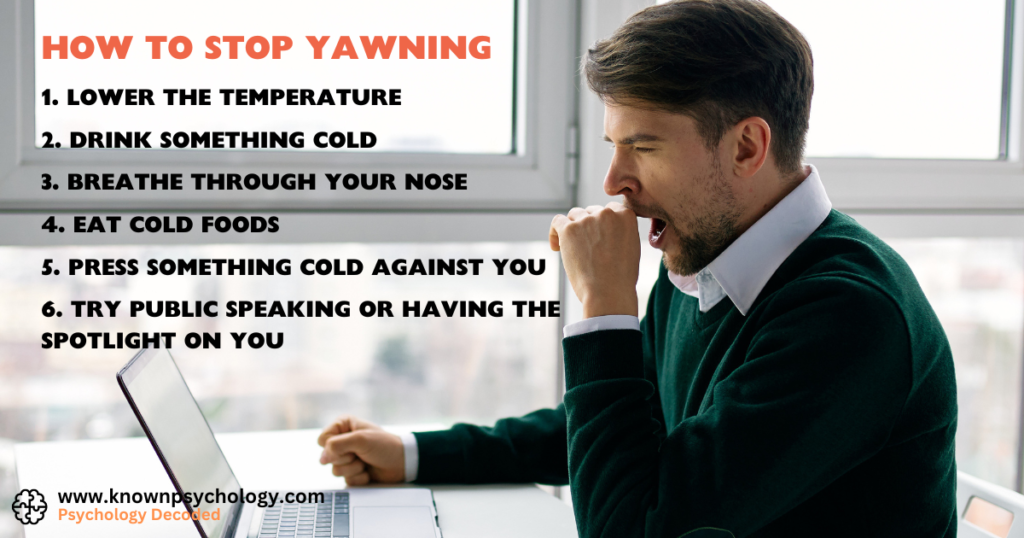
Every single one of us is impacted by yawning at some point. You could still wake up yawning at your work in the morning, even if you had 8 hours of sleep the night before. More sleep won’t solve your problems, however. See how to stop yawning and find out what makes you yawn in this article.
What exactly is a yawn?
When you yawn, you take a long breath in through your nose and out through your mouth as your lungs fill up. Your heart rate might rise by as much as 30% during the six-second average duration of a yawn. Researchers have discovered that the physiological changes that occur when you yawn are distinct from deep breathing in terms of your heart rate, eye closure, lung capacity, and respiration rate, even if they seem identical.
In the womb, yawning may begin as early as eleven weeks after conception, and the typical adult yawns around 20 times every day.
What causes yawning?
Although there isn’t much proof from science as to why humans yawn, it’s likely due to exhaustion, boredom, or the fear of being infectious.
It is common to yawn out of the blue when you’re exhausted. Hypotheses propose that when you don’t get enough sleep, your lungs don’t have as much oxygen, which is why you breathe in more slowly and deeply. Nevertheless, supporting evidence for this viewpoint is scant.
A more reputable research posits that yawning is a natural way for the brain to calm down. The reason for this is because the brain’s temperature drops as air is pumped into it. The rats in this research had their brain temperatures recorded and discovered that they were much higher before yawning, and then much lower for three minutes after yawning.
Seek medical attention if you’ve observed an abrupt and severe increase in your yawning frequency. In order to rule out any potential causes of your lack of sleep, they will likely ask you to record your sleeping patterns. Following that, diagnostic testing may assist in identifying the cause of your excessive yawning and providing guidance on how to stop yawning.
Contagious Yawning
In terms of contagious yawning, the evidence is more concrete. One study found that 50% of participants yawned when watching a video of somebody yawning. Another study also discovered that contagious yawning occurs in families of chimpanzees, macaques, and baboons.
How to stop yawning?
How to stop yawning depends on the reason behind this.
For instance, if your doctor determines that a certain drug is to blame for your yawning, he or she would probably suggest an alternative. Your doctor may suggest using a breathing device while you sleep if you yawn excessively because of a medical issue.
You may modify your way of living to alleviate your yawning problem if you’re in good health. This involves maintaining a regular exercise routine, making an effort to lower your stress levels, and, of course, sleeping at the recommended 8 hours every night.
If you find yourself yawning uncontrollably during uncomfortable situations and are looking for a quick fix to control it, consider trying one of these options.
1. Lower the temperature
You won’t want to yawn and breathe in the cold air as much if you get your core temperature down. Researchers in 2019 discovered that compared to those using a heat pad, those wearing a cold pack around their neck reduced yawning by a factor of three. Make sure a window is open or the heater is turned off.
2. Drink something cold
Fatigue from dehydration may cause yawning. Be sure to bring some water or juice with you to your critical meeting if you haven’t had a good night’s sleep. Another way to bring your fever down is to eat something cold.
3. Breathe through your nose
Since yawning requires opening your lips, it may seem like a no-brainer to try breathing in via your nose instead. “A yawn involves a long inhalation and short exhalation with gaping jaws,” Dr. Robert R. Provine said in an interview with The Healthy. No yawn can be accomplished if your lips are sealed.
4. Eat cold foods
If you’re looking for a way to combat yawning, consider drinking cold beverages or eating cold meals. Chilled fruit is a healthy snack option if you’re trying to cut down on junk food.
5. Press something cold against you
Continuing with the theme of cold, a cool compress applied to the head may also be very effective.The results of the study where the subjects wore cold packs around their necks proved this. Put this on your head for a few of minutes before entering your meeting.
6. Try public speaking or having the spotlight on you
Another discovery that Dr. Robert R. Provine finding from the research is that when individuals are recorded, they tend to refrain from yawning.An impact of social inhibition exists. When people stare at you, they won’t yawn. You won’t yawn as much if someone is watching you. What are you waiting for? Give it a go!
A Note from Known_Psychology
Yawning is most often just a symptom of fatigue, boredom, or a response to those around you yawning a lot. However, if you find yourself yawning more than once a minute, it’s best to see a doctor to rule out any medical conditions. This article was aim to tell you how to stop yawning. Simple changes like getting a regular night’s sleep and reducing stress is best if you can’t stop yawning.
Known Psychology is a collaborative platform run by a dedicated team of psychology experts, professional writers, and experienced editors who are passionate about psychology and mental wellness. We publish evidence-based, easy-to-understand content designed to inform, inspire, and support our global audience. Every article is carefully researched and crafted to provide reliable insights into human behavior, emotional health, therapy techniques, and personal growth strategies. At Known Psychology, we turn complex psychological topics into simple, actionable knowledge.



1,258 thoughts on “What is Yawn & How to stop Yawning?”